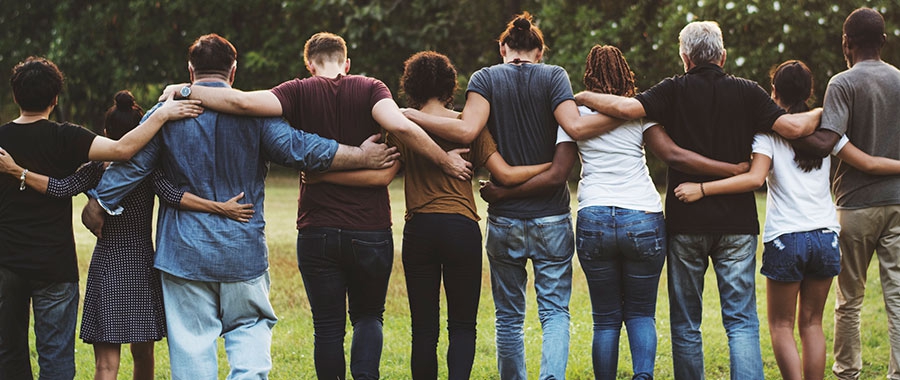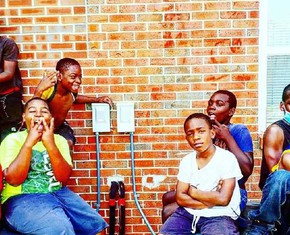The views expressed in our content reflect individual perspectives and do not represent the authoritative views of the Baha'i Faith.
I wouldn’t recommend getting prostate cancer, but I will say this: it sure helps you appreciate your community.
When I had prostate cancer surgery a few months ago (with a successful outcome, thank you very much), friends and family called, wanting to do something to help. Close friends visited in the hospital. Unasked, neighbors brought delicious meals. Family members flew or drove in to spend time together, to help, or just to express their love. Beautiful, fragrant plants and floral arrangements arrived. Our kind, sweet fellow Baha’is from the area brought food, asked if they could run errands, offered to pick up prescriptions or drive me to my doctors’ appointments.
I felt cared for and embraced by my extended community, and truly humbled by their outpouring of love and thoughtfulness. Later, when I learned the good news from the pathology report, I attributed at least some of it to the love, warmth and prayers for my health that I felt from my extended community.
So you can understand why I’ve been thinking about the idea of community lately. When you need the help of others—and even when you don’t—it’s enormously reassuring, comforting and encouraging to know that other people actually care and want to go out of their way to help. You know it, of course, by their actions. That active, loving support from a wide network of caring people—the whole idea of community—is what gets us through the hardest times.
No man is an island, John Donne said, and I can verify that from experience. We aren’t meant to be hermits—we’re social animals, as the old saying goes, and we need a community around us.
It’s certainly true with personal problems, diseases and crises—but it’s even more true in times of devastating natural disasters. Lately we’ve all had a front-row seat to media coverage of hurricanes, earthquakes and floods in various parts of the world, and we can see the enormous difference between people left alone to fend for themselves, and people who have the benefit of a caring community that responds and helps in their time of need.
So, think about it this way: if something happens, do you have an extended community you can rely on, a network of loving, caring close friends, helpers and supporters?
The word community comes originally from the Latin word communis, which means “things held in common.” Community means fellowship and societal organization that goes beyond the immediate family—your extended network of friends, co-workers, co-religionists and societal connections—basically, your tribe.
I’ve come to think of community as a compound word: community = common + unity.
A community is a unified body of individuals, held together by something larger than themselves. But what is real unity? The Baha’i teachings define it this way:
When we observe the human world, we find various collective expressions of unity therein. For instance, man is distinguished from the animal by his degree, or kingdom. This comprehensive distinction includes all the posterity of Adam and constitutes one great household or human family, which may be considered the fundamental or physical unity of mankind. Furthermore, a distinction exists between various groups of humankind according to lineage, each group forming a racial unity separate from the others. There is also the unity of tongue among those who use the same language as a means of communication; national unity where various peoples live under one form of government such as French, German, British, etc.; and political unity, which conserves the civil rights of parties or factions of the same government. All these unities are imaginary and without real foundation, for no real result proceeds from them. The purpose of true unity is real and divine outcomes. From these limited unities mentioned only limited outcomes proceed, whereas unlimited unity produces unlimited result. For instance, from the limited unity of race or nationality the results at most are limited. It is like a family living alone and solitary; there are no unlimited or universal outcomes from it. – Abdu’l-Baha, The Promulgation of Universal Peace, pp. 190-191.
“All these unities are imaginary,” Abdu’l-Baha said. Those imagined unities—of neighborhood, city, state, nation, race, political affiliation and language—can all fade away at a moment’s notice. Neighbor can turn against neighbor, and even people in the same family can hate and attack each other. Patriotism and race don’t guarantee unity, either, as multiple civil wars have proven. Political affiliations and loyalties can break down over a single issue, and language groups can and do oppose each other regardless of their shared mother tongue.
These categories are all ephemeral because they lack any real, lasting foundation, and because they’re based on artificial measures of shared commonality. The only actual, essential unity is our common humanity, the Baha’i teachings say:
Let us leave the discordant arguments concerning outward forms, and let us join together to hasten forward the Divine Cause of unity, until all humanity knows itself to be one family, joined together in love. – Abdu’l-Baha, Paris Talks, p. 127.
This issue of unity and the human family is the chief question of our time.
You see it reflected in every news story every day. You witness it in the social problems in your city, town or village. Whenever and wherever war breaks out, you behold the devastation and destruction a lack of unity can create.
In this series of essays on unity—the central teaching of the Baha’i Faith—we’ll explore what it takes to build and sustain a true and lasting unity that encompasses every person on Earth.
You May Also Like
Comments

















The Master also talked about collective centres, as you have about community, and the greatest collective center is the Kingdom. Once we become part of that we will always be safe and secure.